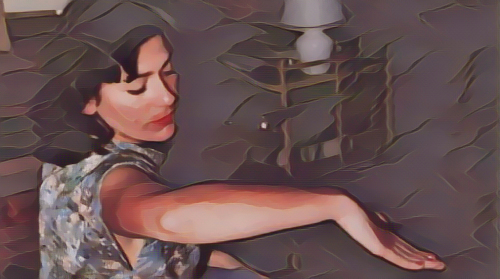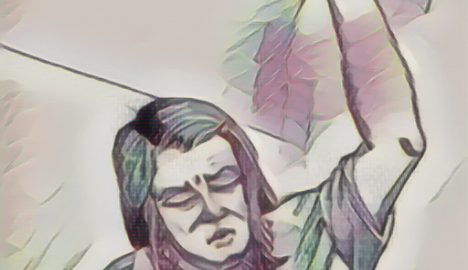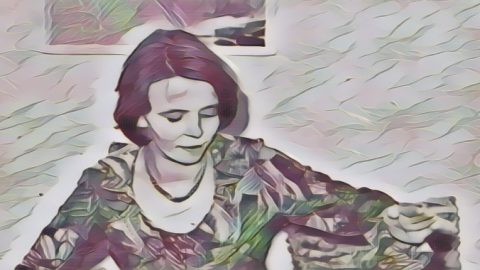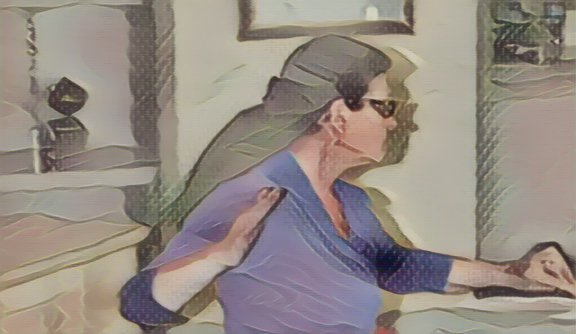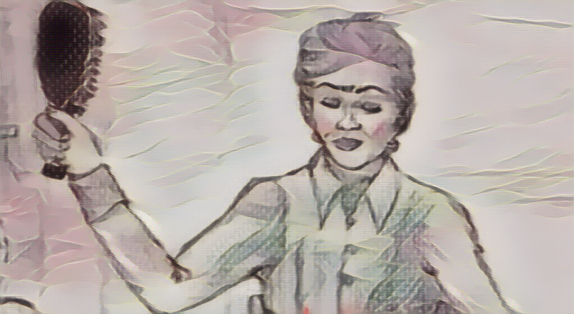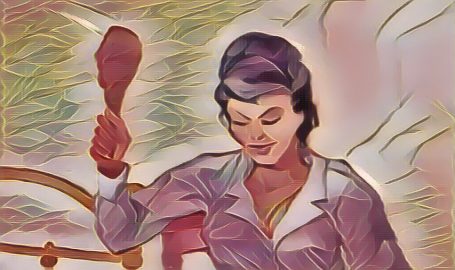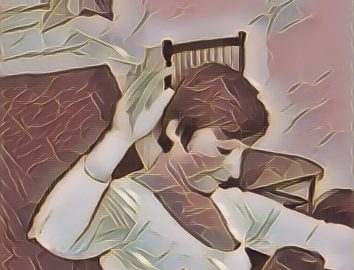(gap: 1s) I was a fairly well-behaved youngster, the sort of child who preferred the company of books to the chaos of playground games. My world was quiet, filled with the gentle rustle of pages and the soft ticking of the clock in our living room. I was shy, my voice rarely rising above a murmur, and I often found myself lost in daydreams, imagining far-off lands and magical adventures. Yet, like every child, I had my moments of mischief—fleeting sparks of rebellion that would flicker and fade as quickly as they came.
(short pause) Growing up in Porthcawl, Wales, in the early 1980s, the world felt both vast and intimate. The salty tang of the sea breeze drifted through our open windows, mingling with the scent of toast and jam in the mornings. Discipline was changing with the times; proper spankings were becoming a thing of the past, whispered about by parents who remembered stricter days. Most of my friends only got a single smack now and then, a token gesture more than a real punishment. The same was true for me—an occasional swat, a brief sting, but nothing more.
(pause) But Auntie Bessie was very much a woman of her generation, and like most of her peers, she firmly believed in smacking as a proper form of discipline. As a mother, she had raised her own children with a clear sense of right and wrong, and when they stepped out of line, she didn’t hesitate to use a smack to set them straight. She was never cruel, but she was resolute—her methods shaped by the times she grew up in. The slipper was her favourite implement, always close at hand, but she was just as likely to reach for a wooden spoon if the situation called for it. Her children knew the sound of her footsteps meant business, and the sight of her reaching for the slipper was enough to bring even the most rebellious to heel.
(short pause) And if her children really overstepped the mark—if they did something truly serious—then it was their father who would step in. He kept his belt hanging on the back of the bedroom door, a silent warning that there were limits not to be crossed. The belt was the ultimate sanction in their family, reserved for only the gravest offences. It was understood by everyone that this was a punishment of a different order, one that carried real weight and left no doubt about the seriousness of what had been done.
(pause) Auntie Bessie and her husband had spent many years in the travelling community, living a life on the move, never quite settling in one place for long. But eventually, they decided to put down roots in Porthcawl. Her husband found steady work at the steel works, his days marked by the clang and heat of the factory floor, while Auntie Bessie became a dinner lady at the local school. The routines of settled life were new to them, but they brought a different kind of stability—a sense of belonging that came from being part of a town, a neighbourhood, a community.
(short pause) I remember the summer my baby sister was born, a time when everything seemed to shift. My parents, preoccupied with the impending arrival, sent me to stay with Auntie Bessie for two weeks. Her house in Porthcawl was a world apart from my own—a place where the air was thick with the scent of woodsmoke and lavender, and every surface seemed to hold a story. Auntie Bessie herself was a force of nature, an old traveller woman with a wild mane of grey hair and eyes that sparkled with secrets. She never quite settled, always restless, as if the walls of her home were too confining for her wandering spirit.
(pause) The first few days were a blur of excitement. We played endless games of “school” in the backyard, chalk dust clinging to our fingers as we scribbled on the old board propped against the fence. The garden was wild and overgrown, buzzing with bees and the distant cries of gulls. Inside, the living room was a jumble of patterned carpets and mismatched cushions, the air always tinged with the faint aroma of tea and coal. Auntie Bessie would let me stay up late, telling me stories of her childhood—of nights spent under the stars, of music and laughter around campfires, of a life lived on the move.
(short pause) But there was one thing that unsettled me: Auntie Bessie’s house was much further from my school than my own. The mornings came earlier, the light barely creeping through the curtains when she would rouse me from sleep. At first, she was gentle, coaxing me out of bed with jokes and playful nudges, her hands warm and rough from years of work. She’d sing little songs, her voice low and melodic, and I’d stumble into the kitchen, still half-dreaming, to the smell of porridge bubbling on the stove.
(pause) But Auntie Bessie’s patience, like the weather on the Welsh coast, could change in an instant. After a few days, the novelty wore off, and my reluctance to leave the comfort of bed began to test her resolve. On the Friday of the first week, her old-fashioned side emerged. I remember the morning vividly—the chill in the air, the way the light slanted through the window, the sound of her footsteps on the creaking floorboards. Without warning, she delivered a single, light smack to my pyjama-clad bottom, her face suddenly stern, her eyes flashing with a mixture of frustration and affection.
(short pause) I was stunned. The sting was more to my pride than my skin, and I stomped out of bed, cheeks burning with indignation. Before I could escape, Auntie Bessie’s hands were on my shoulders, spinning me around with surprising strength. “Peter,” she said, her voice sharp but not unkind, “if you huff like that again or don’t get out of bed on time, I’ll give you a proper smacked bottom, believe you me!” There was a gravity in her words, the weight of someone who had seen the world and refused to be defied by a sleepy child.
(pause) The weekend passed in a haze of activity. We baked scones in the tiny kitchen, the air thick with the scent of butter and jam. We walked along the windswept beach, our footprints trailing behind us in the damp sand. I remember calling my parents from the old rotary phone in the hallway, my voice bubbling with excitement as I told them I was having the best time ever. Auntie Bessie seemed softer then, her laughter returning, her stories growing more elaborate as the evenings stretched on.
(short pause) But Monday morning arrived with a sense of foreboding. The sky was grey, the air heavy with the promise of rain. I burrowed deeper under the covers, clinging to the last remnants of sleep. “Peter, out of bed – now.” Her voice was firmer this time, cutting through the fog of my dreams. I didn’t move. “Peter, you need to get up.” Still, I resisted, the warmth of the bed too inviting to leave behind. “Peter, I’m going to count to three and if you’re not up, you’re getting a smacked bottom.” Her words barely registered as I drifted in that hazy space between sleep and waking.
(pause) Suddenly, the duvet was yanked away, the cold air biting at my skin. My legs were lifted by the ankles, and in a blur of motion, Auntie Bessie became all business. Her hands were strong and sure, the hands of someone used to packing up and moving on at a moment’s notice. I was wide awake now, wriggling irritably, trying to escape her grasp. She sat on the edge of the bed, dragging me by the ankles over her lap. I clawed at the sheets, desperate to get away, but she held me fast, one hand gripping my pyjama shirt, the other tugging my pyjama bottoms down with practiced efficiency.
(short pause) Then, with a practiced motion, Auntie Bessie reached for her trusty slipper—the very one that always seemed to be within arm’s reach, its faded blue fabric and sturdy rubber sole a familiar sight in her house. She held it up for a moment, almost ceremonially, as if to remind me and herself of its purpose. The slipper was well-worn, the sole slightly curved from years of use, and it fit perfectly in her hand. I remember the way she flexed it, testing its weight, before bringing it down with a sharp, echoing smack across my bare bottom. The first five smacks landed with a force that took my breath away, the rubber sole delivering a sting that was both immediate and deep. Each strike was punctuated by the soft thud of slipper on skin, the sound filling the small room and making my heart race.
(pause) I screeched, my protests bouncing off the walls, but there was no escape. Auntie Bessie paused, her hand resting on my stinging skin, the heat radiating through me. The pain was different from the casual swats I’d known before—a deep, aching burn that settled in, making my eyes water. In that moment, the warmth I’d come to associate with her was gone, replaced by a stern resolve that brooked no argument. She set the slipper aside for a moment, and I thought it was over, but then she reached for the wooden spoon that always hung from a hook by the kitchen door. She must have brought it in with her, just in case. The spoon was thick and heavy, its handle smooth from years of stirring porridge and soup. She gave me three sharp smacks with the spoon, each one landing squarely on the lower part of my bottom, the pain sharper and more focused than the slipper’s broad sting.
(short pause) “Are you going to be a good boy and get up on time tomorrow?” she asked, her voice weary but commanding, as if she’d asked the same question a hundred times in a hundred different places. I was furious, humiliated, and in my anger, I blurted out the first thing that came to mind—a phrase I’d picked up from a children’s television show. “Bog off!” The words hung in the air, sharper than any smack, and I instantly regretted them.
(pause) Auntie Bessie’s eyes narrowed, her expression hardening. She picked up the slipper again, her grip tightening. The next round of smacks was different—slower, more deliberate, each one landing with a precision that left no part of my bottom or upper thighs untouched. She alternated between the slipper and her open hand, the slipper’s rubber sole delivering a deep, resonant sting, while her hand brought a sharper, more personal pain. My screeching gave way to sobs, the pain overwhelming, my resistance crumbling. After what felt like an eternity—twenty-five smacks, maybe more—I was limp and defeated, my bottom burning, my pride in tatters.
(short pause) When it was over, Auntie Bessie let me up, her face softening as she handed me a handkerchief to wipe my tears. She didn’t say much, just ruffled my hair and told me to get dressed. The rest of the day passed quietly, a strange peace settling between us. I moved gingerly, the memory of the morning’s lesson lingering with every step.
(short pause) Looking back now, I can see that Auntie Bessie’s moods were as unpredictable as the tides—sometimes gentle, sometimes fierce, but always unforgettable. Her house, with its clutter and warmth, became a place of transformation for me. I learned about boundaries, about the strength of old traditions, and about the complicated love that can exist between a child and an adult who refuses to be anything less than herself. Even now, the scent of woodsmoke and the sound of a creaking floorboard can transport me back to those days, to the slipper incident, and to the lessons I carry with me still.
